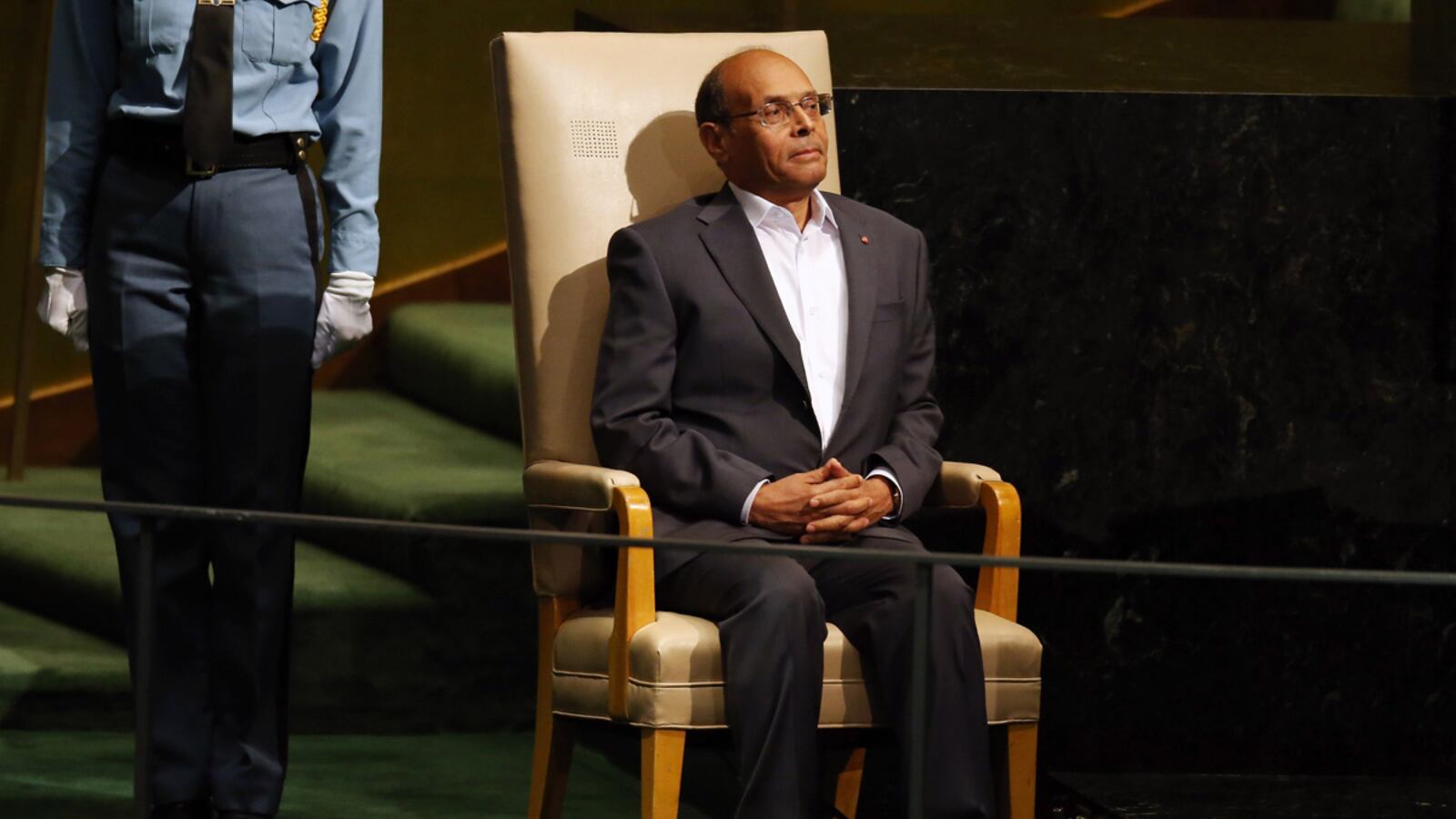Moncef Marzouki, the fourth president of Tunisia, spoke today at the Council on Foreign Relations, a day after addressing the U.N. for the first time since assuming power in December of last year. Marzouki responded to questions from Gideon Rose, the editor of Foreign Affairs, as well as those from the audience and members of the Council on Foreign Relations’ online community.
Tunisia was the first in a string of Middle Eastern countries to go through autocrat-toppling protests. In January 2011, then-president Zine El Abidine Ben Ali fled to Saudi Arabia with his family after massive demonstrations against his regime shook the country. Regime changes followed in Egypt, Libya, and Yemen; civil discord soon landed in Syria and Bahrain; protests then swept throughout the Arab world.
“I think it’s fair to say that in the last couple of years, the Arab Spring has been the dominant event not just of these years but of the entire new century,” said Rose, in his introduction of Marzouki. “Tunisia has not only led the way but shown the way. It was not only first but has turned out so far extremely successfully, and it is a continuing example to the region and to the world.”
As far back as the ’90s, Marzouki was an activist who focused on human-rights violations, including torture. “Nobody [was] teaching that dictatorship is the worst thing in the world,” he said, repeatedly referring to dictatorships as a “social disease” over the course of the evening. In 2002, after a brief imprisonment, where he was tortured and kept in solitary confinement, Marzouki moved to France and lived in exile for nearly a decade.
“I thought I would probably die before seeing the revolution,” he said. Marzouki returned just days after Ben Ali was deposed.
One of Tunisia’s major economic concerns is its reliance on the European economy and on tourism in particular. But with direct flights only to the African countries of Chad and Senegal from Europe, the country will need a lot of development to be a tourism attraction. Marzouki hopes to bring in more visitors from the West and Japan, citing Tunisia’s Mediterranean coasts, diverse cultural history and what he claims are the best dates in the world as enticements. “Just don’t ask the Algerians,” he joked.
He also addressed growing concerns over Salafism in the region, stressing that Islamicism is far from a homogeneous movement. Salafis, whom Marzouki identifies as the fringe of a far-right fringe, are “dangerous to the image of the country,” but “not dangerous for national stability.”
When asked about the transition from autocracy in other Middle Eastern countries, Marzouki responded positively. “The old political system of one man, the way of fear, corruption—that is completely dead.” He continued presenting a spectrum of revolutions, with Tunisia at one end and Syria at the other: “Tunisia is a lucky country because our revolution is peaceful; we had [only] 300 martyrs, 2,000 injured.”

Given his history as a human-rights activist, Marzouki is conflicted over what role Tunisia and the West should play in the ongoing revolutions throughout the Middle East. When Rose asked him if he thought Tunisia should actively try to aid parts of the world under authoritarian regime, he replied, “As a human-rights activist, I would say ‘yes,’ but as a head of state, I would say, ‘Look, uh, Tunisia is, eh…’”
Marzouki showed great frustration for this past week’s cover of Newsweek, for Ayaan Hirsi Ali’s story in that issue, calling it “completely ridiculous.” He compared it to Middle Eastern magazines covering the Aurora, Colo., shooting and calling it “American Rage.” He stressed over the course of his talk that the Arab world was not homogeneous, but just as fractured and diverse as anywhere else.
“Let me be clear. We have to be careful with your extremists and our extremists, because I think they are dangerous for you and dangerous for us.” He continued: “We can become hostages of the two extremists.”
While Tunisia may be ridden of Ben Ali, the former dictator’s regime was in place for more than two decades and upheld by networks of supporters. Since the revolution, the new government has chosen not to pursue or punish any of the people who participated in Ben Ali’s regime. Marzouki even decided not to hunt down the people responsible for his own torture. Instead, he hopes to model the country’s response after South Africa’s Truth and Reconciliation campaign.
“It’s a difficult choice because you have to deal with your enemies knowing that they are there and they can harm you and they will do everything to destroy the democratic process,” he explained. “But because we are democrats, we must rely on our capabilities to face them.”
The former supporters of Ben Ali are among the most vocal critics of the new democratic regime, and Marzouki jokes that in democracy everyone enjoys freedom of speech except the government. “We brought it, now we’re victims of it.”






